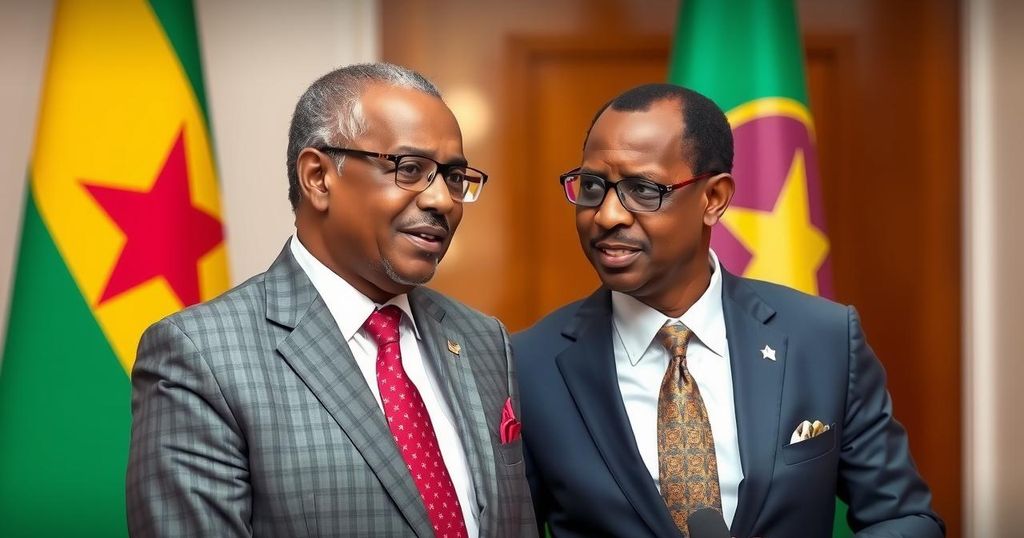Somalia President to Visit Ethiopia in Efforts to Enhance Peace and Cooperation

Somalia’s President Hassan Sheikh Mohamud will visit Ethiopia to strengthen diplomatic ties following a peace deal aimed at easing tensions in the Horn of Africa. Historical grievances, particularly around Ethiopia’s ambitions for maritime access and its agreement with Somaliland, present challenges. Mutual cooperation is encouraged, but unresolved issues remain, particularly regarding Ethiopia’s future maritime arrangements and regional alliances against its ambitions.
On Saturday, the President of Somalia, Hassan Sheikh Mohamud, is scheduled to visit Addis Ababa, Ethiopia, as both nations strive to enhance diplomatic relations following a recent peace agreement. This accord aims to alleviate escalating tensions in the Horn of Africa, particularly surrounding Ethiopia’s quest for maritime access, which has historically strained relations with its neighboring countries. Somalia was initially alarmed when Ethiopia established a partnership with Somaliland, recognizing its independence in exchange for access to port facilities and a military base. Fortunately, recent negotiations, mediated by Turkey, have paved the way for a renewed cooperative approach between Somali and Ethiopian leadership.
During the anticipated visit, President Mohamud’s office noted that the agenda reflects the mutual agreement reached in Ankara, signifying a collaborative shift between the two nations. However, several issues remain unaddressed, particularly concerning the means by which Ethiopia may attain maritime access and the future of its agreements with Somaliland. This diplomatic uncertainty was echoed during discussions in Cairo, where the foreign ministers of Somalia, Eritrea, and Egypt convened to express their collective concerns regarding Ethiopia’s strategic aspirations in the Red Sea region. Egypt’s Foreign Minister, Badr Abdelatty, emphasized the sovereignty of coastal nations in managing the security of the Red Sea, reiterating the need for regional governance.
The emergence of an alliance among Egypt, Eritrea, and Somalia, formalized in October during a summit, underscores their shared apprehensions towards Ethiopia’s interests. In light of these developments, Egypt has bolstered military cooperation with Somalia, deploying troops to assist in combating Islamist militants within the nation under the newly established African Union Support and Stabilization Mission in Somalia (AUSSOM). This multifaceted situation illustrates the complexities and potential for both conflict and collaboration among Horn of Africa countries as they navigate shared political and security challenges.
The geopolitical climate in the Horn of Africa is characterized by intricate relationships and historical grievances, particularly between Ethiopia and Somalia. This region has been marked by tensions arising from Ethiopia’s pursuit of coastal access, a goal that has implications for its relations with neighboring countries. The strife concerning the recognition of Somaliland’s independence by Ethiopia and its ramifications on Somalia further complicates the situation. Recent mediation by Turkey has facilitated a peace agreement between the two nations, though underlying issues remain to be resolved.
The upcoming visit of Somalia’s President Hassan Sheikh Mohamud to Ethiopia signifies a positive step towards mitigating tensions and fostering cooperation in the Horn of Africa. While a recent peace agreement marks an important milestone, several unresolved questions surrounding Ethiopia’s maritime access and its dealings with Somaliland indicate that challenges persist. The formation of a regional alliance against potential threats from Ethiopia highlights the ongoing complexities in the region. The evolving dynamics will require careful navigation and sustained diplomatic efforts to ensure lasting stability and peace.
Original Source: www.citizen.digital








